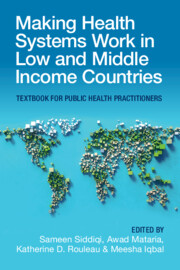 Making Health Systems Work in Low and Middle Income Countries
Making Health Systems Work in Low and Middle Income Countries Book contents
- Making Health Systems Work in Low and Middle Income Countries
- Reviews
- Making Health Systems Work in Low and Middle Income Countries
- Copyright page
- Dedication
- Contents
- About the Editors
- Contributors
- Preface
- Section 1 Analyzing Health Systems: Concepts, Components, Performance
- Section 2 Transforming Health Systems: Confronting Challenges, Seizing Opportunities
- Chapter 15 Universal Health Coverage and Beyond
- Chapter 16 Pro-Poor Expansion of Universal Health Coverage
- Chapter 17 Health Insurance for Advancing Universal Health Coverage
- Chapter 18 From Passive to Strategic Purchasing in Low and Middle Income Countries
- Chapter 19 Good Governance and Leadership for Better Health Systems
- Chapter 20 Developing a Balanced Health Workforce
- Chapter 21 Enhancing Equitable Access to Essential Medicines and Health Technologies
- Chapter 22 Health Information and Information Technology
- Chapter 23 Using Health Research for Evidence-Informed Decisions in Health Systems in L&MICs
- Chapter 24 Integrated People-Centered Health Care
- Chapter 25 Strengthening Hospital Governance and Management to Become High-Performing Organizations
- Chapter 26 Improving the Quality and Safety of Health Care in Low and Middle Income Countries
- Chapter 27 Harnessing the Contribution of the Private Health Care Sector toward Public Health Goals
- Chapter 28 Public–Private Partnership in Health Care Services
- Chapter 29 Embedding People’s Voice and Ensuring Participatory Governance
- Chapter 30 Achieving Health-Related Sustainable Development Goals
- Chapter 31 The Determinants of Health Systems
- Chapter 32 Integrating Essential Public Health Functions in Health Systems
- Chapter 33 Engaging in a Health Care Recovery Process
- Chapter 34 Health System Response to the COVID-19 Pandemic
- Chapter 35 Understanding the Global Health Architecture
- Chapter 36 Political Economy of Health Reforms in Low and Middle Income Countries
- Chapter 37 Better Health Systems for Better Outcomes
- Index
- References
Chapter 21 - Enhancing Equitable Access to Essential Medicines and Health Technologies
from Section 2 - Transforming Health Systems: Confronting Challenges, Seizing Opportunities
Published online by Cambridge University Press: 08 December 2022
- Making Health Systems Work in Low and Middle Income Countries
- Reviews
- Making Health Systems Work in Low and Middle Income Countries
- Copyright page
- Dedication
- Contents
- About the Editors
- Contributors
- Preface
- Section 1 Analyzing Health Systems: Concepts, Components, Performance
- Section 2 Transforming Health Systems: Confronting Challenges, Seizing Opportunities
- Chapter 15 Universal Health Coverage and Beyond
- Chapter 16 Pro-Poor Expansion of Universal Health Coverage
- Chapter 17 Health Insurance for Advancing Universal Health Coverage
- Chapter 18 From Passive to Strategic Purchasing in Low and Middle Income Countries
- Chapter 19 Good Governance and Leadership for Better Health Systems
- Chapter 20 Developing a Balanced Health Workforce
- Chapter 21 Enhancing Equitable Access to Essential Medicines and Health Technologies
- Chapter 22 Health Information and Information Technology
- Chapter 23 Using Health Research for Evidence-Informed Decisions in Health Systems in L&MICs
- Chapter 24 Integrated People-Centered Health Care
- Chapter 25 Strengthening Hospital Governance and Management to Become High-Performing Organizations
- Chapter 26 Improving the Quality and Safety of Health Care in Low and Middle Income Countries
- Chapter 27 Harnessing the Contribution of the Private Health Care Sector toward Public Health Goals
- Chapter 28 Public–Private Partnership in Health Care Services
- Chapter 29 Embedding People’s Voice and Ensuring Participatory Governance
- Chapter 30 Achieving Health-Related Sustainable Development Goals
- Chapter 31 The Determinants of Health Systems
- Chapter 32 Integrating Essential Public Health Functions in Health Systems
- Chapter 33 Engaging in a Health Care Recovery Process
- Chapter 34 Health System Response to the COVID-19 Pandemic
- Chapter 35 Understanding the Global Health Architecture
- Chapter 36 Political Economy of Health Reforms in Low and Middle Income Countries
- Chapter 37 Better Health Systems for Better Outcomes
- Index
- References
Summary
Pharmaceutical systems are a core part of health systems, and their failure to work adequately severely undermines the performance of the entire health system. The view that medicines are mere commodities managed for technical aspects by the national regulatory authority, disregards the role and need for a comprehensive and multidisciplinary system to ensure access to essential medicines. This has serious consequences, as it leaves key functions underfunded and under-represented in national and international platforms where decisions related to health care systems and for achievement of UHC are made. Key strategies to strengthen pharmaceutical systems have been extensively described, but their effective implementation requires political commitment, institutional oversight and adequate financial allocation to each function, including quality assurance, financing, supply and transparency among others. Assessing pharmaceutical systems is often neglected but essential for promoting an effective health system as well as population health. The Chapter presents some key performance measures that countries should routinely apply to measure and report on the performance of pharmaceutical systems and on their good governance.
Keywords
- Type
- Chapter
- Information
- Making Health Systems Work in Low and Middle Income CountriesTextbook for Public Health Practitioners, pp. 320 - 335Publisher: Cambridge University PressPrint publication year: 2022
